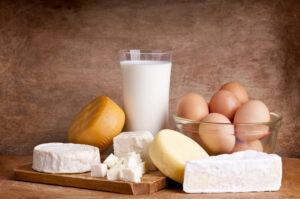Best Practices For Buying Eggs, Dairy, and Snacks
Article At a Glance:
• Smart shopping for eggs means knowing how to navigate different marketing terms on the labels
• It’s best to limit intake (or even avoid) consuming dairy
• The healthiest snacks are naturally-occurring, low in sugar, and have only a few ingredients
Helping a child with autism overcome behavioral and emotional challenges starts with healing their gut through nutritious food, which all begins with making smart decisions at the grocery store. As we’ve done previously on this site, let’s go through some guiding principles for shopping:

Eggs
Eggs are one of the best foods we can feed to our children. Sometimes referred to as a superfood, they’re packed with protein, good fat, and nutrients. The most confusing thing about buying eggs are the marketing terms used on the label. Here’s a rundown of what they all mean:
Pastured Eggs- These are from chickens that live outdoors (and are therefore much healthier). The yolk is a deep orange-like color because it contains more nutrients (like omega-3s, which are great for brain development).
Organic– This simply means that there are no pesticides or antibiotics, and that the chicken feed was not genetically modified.
Cage-Free- While this may be a good choice for families concerned about more humane treatment of animals, just because the chickens were not in cages does not necessarily mean they were outdoors (though they still do have more room to move).
Free-Range- There is no real standard for this term and it only really means that the chickens have some amount of time to move freely.
100% Vegetarian-Fed– While this may sound impressive and health-conscious, it means that the chickens were fed a non-natural diet (as they naturally eat insects and grubs), so it’s just another marketing message.
Overall, when it comes to eggs, the more expensive brands aren’t necessarily the best. Test out a few different types and look for things like a dark yolk and a hard shell (as these indicate more nutrients).
Dairy
Much has been written and said about dairy among health gurus in recent years. From my end, I have found no good evidence of reasons to consume dairy from a dietary perspective. There are a number of great alternatives for cow’s milk, for example, and we’ve increasingly seen ways that dairy can irritate the gut. If you or your child cannot give it up completely, opt for grass-fed organic cheese, limit the quantity consumed, consider supplementing with digestive enzymes, and stay away from things like yogurt (which often has loads of sugar and artificial coloring).
Snacks
The best advice I can give you about snacks is to choose foods that are natural and whole. Things like an apple, raw nuts, etc. If you do decide to give your child something that is packaged, choose something that has few ingredients that are easy to pronounce and understand. The RXBAR™ can be a great option!
References
6 Reasons Why Eggs Are the Healthiest Food On The Planet
17 Science-Based Benefits of Omega-3 Fatty Acids
The 9 Best Nondairy Substitutes for Milk
The Toxins In Foods That Big Companies Don’t Want You To Know About
*This website is provided for informational purposes only and is not intended as a substitute for the advice provided by a healthcare professional.

A Revolutionary 5-1 Bio-Heal Probiotic
Helping Children Reach Their Full Potential
Click To Learn More
Join Our Community
Join the premier support group of parents, teachers, and caretakers dedicated to
Click To Learn More




